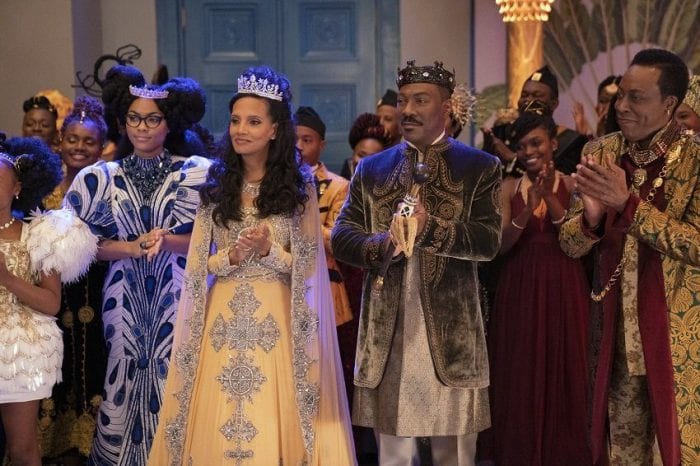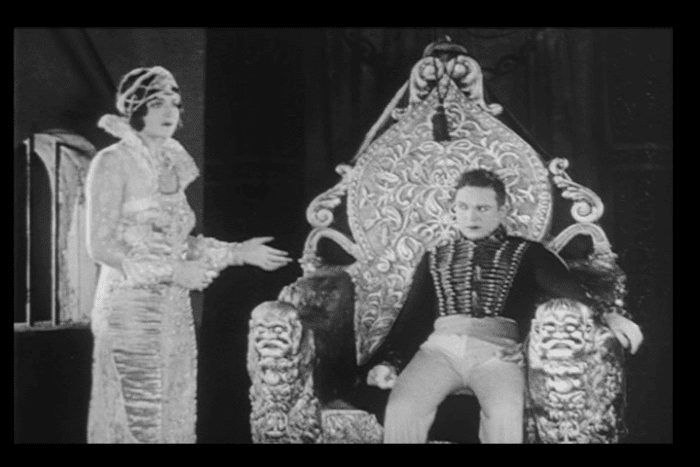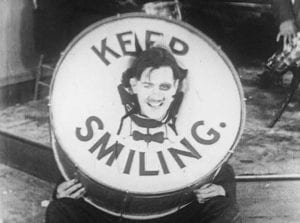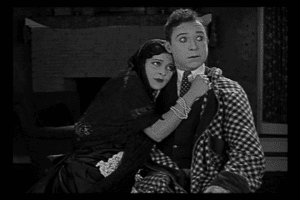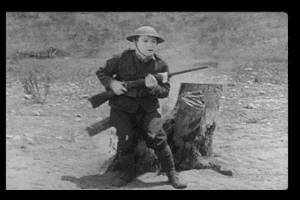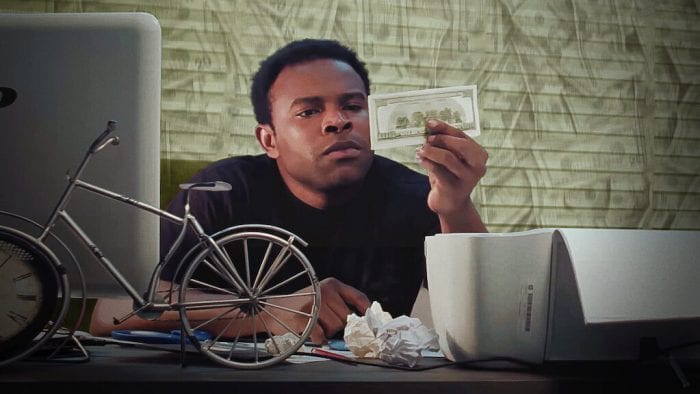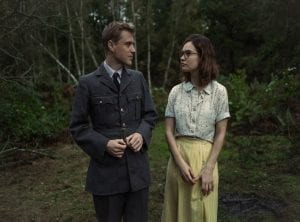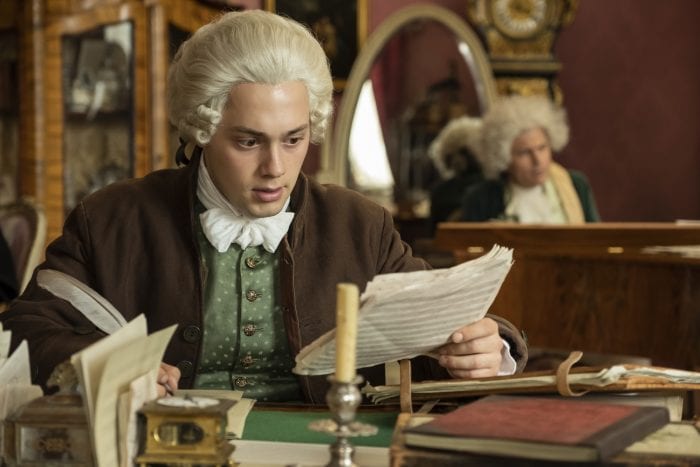Reviewed by Jeffrey Sanzel
Eddie Murphy is one of America’s most successful performers. He began his career in stand-up comedy, and he followed this with a memorable stint on Saturday Night Live. His film work has included some of the most iconic comedic movies of the 80s: 48 Hrs., Trading Places, Beverly Hills Cop, and Coming to America.
Coming to America (1988) starred Murphy as Akeem Joffer, the Crown Prince of the African nation of Zamunda. On his twenty-first birthday, he decides that instead of a prearranged marriage, he will go to America to find a wife. With a coin flip, he chooses New York and selects Queens as the logical place to seek her out. He falls in love with Lisa Macdowell (Shari Headley), the oldest daughter of a fast-food restaurant owner (John Amos).
 In addition to his wide-eyed and well-intentioned if slightly oblivious royal, Murphy and co-star Arsenio Hall each played another three supporting roles. The film was funny, raunchy, and a huge hit. While critical response was mixed, it was a financial success. Coming to America was Paramount’s highest-earning film and the third-highest-grossing film in United States box office. Its worldwide total is estimated as high as $350 million. (It is Eddie Murphy’s eighth highest-grossing film.)
In addition to his wide-eyed and well-intentioned if slightly oblivious royal, Murphy and co-star Arsenio Hall each played another three supporting roles. The film was funny, raunchy, and a huge hit. While critical response was mixed, it was a financial success. Coming to America was Paramount’s highest-earning film and the third-highest-grossing film in United States box office. Its worldwide total is estimated as high as $350 million. (It is Eddie Murphy’s eighth highest-grossing film.)
Thirty years is a longtime to wait for a sequel: Coming 2 America. It is directed by Craig Brewer, with a screenplay by Kenya Barris, Barry W. Blaustein, and David Sheffield, from a story by Blaustein, Sheffield, and Justin Kanew, based on characters created by Eddie Murphy. Many cooks created a fairly thin broth.
The King (James Earl Jones) is dying, and Akeem will succeed him. By the country’s law, the succession may only pass onto a male heir. Revealed is that while accidentally high, Akeem had a one-night stand with Mary Junson (Leslie Jones) before meeting Lisa (Headley) and fathered a son, Lavelle (Jermaine Fowler). Akeem and Semmi (Hall) return to New York and bring Lavelle and Mary back to Zamunda. Akeem plans to train Lavelle as the crown prince. Shortly after, Lavelle sends for Mary’s brother, his Uncle Reem (Tracy Morgan).
 Meanwhile, Zamunda faces a threat from its militaristic neighbor Nextdoria, ruled by dictator General Izzi (Wesley Snipes). Izzi is the older brother of Imani (Vanessa Bell Calloway), who Akeem jilted in the first film. Upon discovery that Akeem has a successor, the General wants Lavelle to marry his daughter Bopoto (Teyana Taylor). All of this frustrates Akeem’s capable eldest daughter, Princess Meeka (KiKi Layne), who aspires to run the kingdom. While being trained as a prince, Lavelle falls in love with his no-nonsense royal groomer Mirembe (Nomzamo Mbatha).
Meanwhile, Zamunda faces a threat from its militaristic neighbor Nextdoria, ruled by dictator General Izzi (Wesley Snipes). Izzi is the older brother of Imani (Vanessa Bell Calloway), who Akeem jilted in the first film. Upon discovery that Akeem has a successor, the General wants Lavelle to marry his daughter Bopoto (Teyana Taylor). All of this frustrates Akeem’s capable eldest daughter, Princess Meeka (KiKi Layne), who aspires to run the kingdom. While being trained as a prince, Lavelle falls in love with his no-nonsense royal groomer Mirembe (Nomzamo Mbatha).
Coming 2 America is a mirror image of the first film — another fish-out-of-water comedy but in reverse. Instead of a prince lost in the modern American chaos, it is an urban American transplant struggling in Africa’s royal wilds. Most humor dwells in low-hanging fruit, trading on vulgar jokes, rehashing some of the funnier bits from the first film, and the occasional meta-jab (for example, a shot at sequels).
Leslie Jones is saddled with the most obvious lines: When told that what she thinks are black mashed potatoes is caviar, she turns to Lavelle and says, “You have a cousin named Caviar.” The return to the barbershop with Murphy and Hall reprising their roles is a portrait of political incorrectness. This would be fine if used to make a statement of some kind; instead, it is a way to shoehorn the old jokes. Hall’s predatory minister, Reverend Brown, falls into the same category: a retread with no reward. The film even stoops to a circumcision joke.
Worse, the threat of war with Nextoria is hardly benign but a bizarre attempt is made to play it for laughs. But the guns, the soldiers, and the violence are very real.
 The movie has a few strong moments. One of the best scenes involves a job interview. Lavelle comes into direct conflict with white privilege, embodied by Mr. Duke (Colin Jost). The scene is genuinely funny—Lavelle uses his “white voice” to attempt to secure a position for which he is qualified but under-educated. The encounter reflects Lavelle’s day-to-day challenges. It helps that Fowler has an easy charm and is genuinely likable. His strut is a thin mask for a good young man who wants to grow into a better adult. He never severs his connection to his Queens roots but is open to what Zamunda has to offer. Fowler owns his hero’s journey.
The movie has a few strong moments. One of the best scenes involves a job interview. Lavelle comes into direct conflict with white privilege, embodied by Mr. Duke (Colin Jost). The scene is genuinely funny—Lavelle uses his “white voice” to attempt to secure a position for which he is qualified but under-educated. The encounter reflects Lavelle’s day-to-day challenges. It helps that Fowler has an easy charm and is genuinely likable. His strut is a thin mask for a good young man who wants to grow into a better adult. He never severs his connection to his Queens roots but is open to what Zamunda has to offer. Fowler owns his hero’s journey.
Eddie Murphy is no longer the innocent but self-actualized prince. However, it hasn’t been replaced with any true self-awareness until far too late in the story. His prince was a master of his fate; his king plays more as a sitcom husband who seems constantly perplexed by everything around him. Is this a function of three decades away from the role? Or from indecision in the writing? Either way, while central to the film, his energy is intermittent, and his presence is almost secondary.
The same problem could be said of Headley’s Lisa, who was so wonderfully strong. Here, she seems lost, neither queen nor commoner. The writers use the simplistic device of getting her drunk so that she may speak her inner voice.
Hall gives the same reliable performance and has not appeared to have aged at all He, like Fowler, has an inherent likability. He has less to do with seemingly lower stakes, but he makes the most of his screen time.
 Both Jones and Morgan have the same material they’ve been given elsewhere but usually better crafted. As they have cornered the particular brand of humor, their laughs come easily but their sources are uninspired. In contrast, Layne and Mbatha play it straight and come out with dignity if no laughs.
Both Jones and Morgan have the same material they’ve been given elsewhere but usually better crafted. As they have cornered the particular brand of humor, their laughs come easily but their sources are uninspired. In contrast, Layne and Mbatha play it straight and come out with dignity if no laughs.
Perhaps best of all is Wesley Snipes’ psychotic General. Entering in increasingly outrageous military garb, he seems to be having a grand time chewing the scenery and taking Izzi to the extreme. It is a departure from his usual portrayals, and he makes him both hilarious and dangerous.
John Amos and Louie Anderson return in their roles from the first film, but it feels like they’re trotted out more for the nostalgia than for what they can add to the story. There is a wide range of cameos, including Morgan Freeman, En Vogue, Salt-N-Pepa, and Gladys Knight. Murphy’s daughter, Bella, plays the middle princess.
Visually, the film is striking. Ruth E. Carter’s extraordinary costumes match Jefferson Sage’s rich production design. Fatima Robinson’s choreography is joyously athletic.
The film tries to make some feminist statements, but it gets wobbly when entering this territory. Throughout, it vaguely hints around it but doesn’t fully address the idea until the end when it also introduces the idea of finding one’s destiny. The writers want to cover all their bases and give short shrift to the value of both concepts.
Sadly, Coming 2 America is a sequel that so many wanted, and so few will find satisfying.
Rated PG-13, the movie is currently streaming on Amazon Prime Video
Photos courtesy of Amazon Studios

